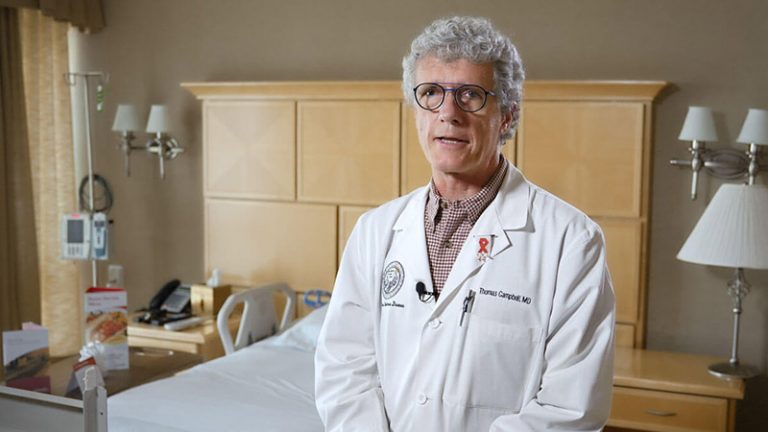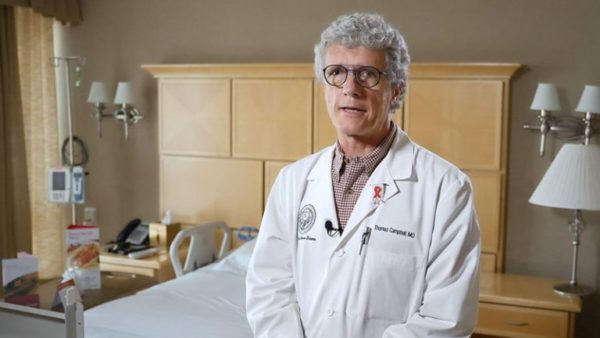
21 Nov UCHealth: Coronavirus Vacccine Update!
We curated this excellent article by Ted Neff from UCHealth Today. The title: “UCHealth coronavirus vaccine trials continue as hospitals prepare for mass vaccination.” Neff notes: “Moderna and Pfizer have reported excellent early results from vaccine clinical trials. Vaccines aren’t approved yet, and the rollout will take massive mobilization efforts.” If all goes well, vaccines could be available to general public late second-quarter/early third-quarter 2021. Key to success will be distribution, administration, and tracking of billions of people around the world – and more.
For information about enrollment or questions about UCHealth’s Oxford/AstraZeneca vaccine trial at UCHealth’s hospitals in northern Colorado, call 970-624-1589 or email nococovidresearch@uchealth.org.
Go here for other fact-filled corona posts from UCHealth.

Dr. Thomas Campbell leads UCHealth’s clinical trial of Moderna’s coronavirus vaccine at UCHealth University of Colorado Hospital on the Anschutz Medical Campus. Photo: UCHealth.
Early results from clinical trails have shown that vaccines may be nearly 95% effective in preventing the transmission of COVID-19.
An independent safety and data monitoring board reported today that early results from the Moderna Phase 3 clinical trials show the company’s vaccine was 94.5% effective.
That news followed equally positive preliminary results on Nov. 9 from Pfizer showing that the coronavirus vaccine that Pfizer developed with German drugmaker BioNTech looks to be safe and more than 90% effective in preventing COVID-19 transmission.
While Phase 3 trials continue, Moderna and Pfizer are expected to ask the U.S. Food and Drug Administration for emergency approval for their new vaccines later in the coming weeks. Experts predict that approval could come in mid-to-late December.
Pfizer expects to have 50 million doses ready to administer by the end of the year. Given that the vaccine involves a booster shot at the 28-day mark, those doses could protect 25 million people. The company says it aims to produce another 1.3 billion doses in 2021.
Moderna expects to have about 20 million doses of their vaccine ready to ship within the U.S. by year’s end and plans to manufacture and ship about 500 million to 1 billion doses globally in 2021. The Moderna vaccine also requires a booster shot.
Coronavirus vaccine trials
The news from Moderna and Pfizer bodes well for the beginning the end of the COVID-19 pandemic and for other coronavirus vaccines. Two of them – the Moderna and Oxford/AstraZeneca vaccine – are in late-stage clinical trials at UCHealth.
Dr. Thomas Campbell leads UCHealth’s clinical trial of Moderna’s coronavirus vaccine at UCHealth University of Colorado Hospital on the Anschutz Medical Campus. Photo: UCHealth.
“I think that these early results are very exciting – they demonstrate very high efficacy in the short term, and the results in the Moderna study are very consistent with the results of the Pfizer study we heard about last week,” said Dr. Thomas Campbell, the University of Colorado School of Medicine and UCHealth virologist and infectious-disease specialist who leads the Moderna trial at UCHealth. “So we have two independent scientific experiments that are analyzing two very similar vaccine strategies that give us very high confidence that these results are real.”Campbell added, though, that the Moderna trial happening at UCHealth University of Colorado Hospital on the Anschutz Medical Campus and 88 other sites will run for a total of two years.
“It’s important to continue, because we need to know both longer-term safety and efficacy,” he said.
‘Good immunity’ in studied coronavirus vaccines
The similarity between the Moderna and Pfizer vaccines also should extend to the Oxford/AstraZeneca COVID-19 vaccine, says Dr. Gary Luckasen, who is leading the Oxford/AstraZeneca vaccine trial at UCHealth’s northern Colorado hospitals.
Both the Moderna and Oxford/AstraZeneca COVID-19 vaccines introduce SARS-CoV-2 (the virus that causes COVID-19) spike proteins to the body just as Pfizer’s vaccine does…


Sorry, the comment form is closed at this time.